- Home
- V. S. Naipaul
In a Free State Page 3
In a Free State Read online
Page 3
The girl woke me up. She was almost screaming, ‘It’s you, isn’t it? Isn’t it?’
I thought she was going to tear the shirt off me. I pulled back and leaned hard on the window. She burst into tears and nearly tripped on her sari as she ran up the aisle to get the man in uniform.
Nightmare. And all I knew was that somewhere at the end, after the airports and the crowded lounges where everybody was dressed up, after all those take-offs and touchdowns, was the city of Washington. I wanted the journey to end but I couldn’t say I wanted to arrive at Washington. I was already a little scared of that city, to tell the truth. I wanted only to be off the plane and to be in the open again, to stand on the ground and breathe and to try to understand what time of day it was.
At last we arrived. I was in a daze. The burden of those bundles! There were more closed rooms and electric lights. There were questions from officials.
‘Is he diplomatic?’
‘He’s only a domestic,’ my employer said.
‘Is that his luggage? What’s in that pocket?’
I was ashamed.
‘Santosh,’ my employer said.
I pulled out the little packets of pepper and salt, the sweets, the envelopes with scented napkins, the toy tubes of mustard. Airline trinkets. I had been collecting them throughout the journey, seizing a handful, whatever my condition, every time I passed the galley.
‘He’s a cook,’ my employer said.
‘Does he always travel with his condiments?’
‘Santosh, Santosh,’ my employer said in the car afterwards, ‘in Bombay it didn’t matter what you did. Over here you represent your country. I must say I cannot understand why your behaviour has already gone so much out of character.’
‘I am sorry, sahib.’
‘Look at it like this, Santosh. Over here you don’t only represent your country, you represent me.’
For the people of Washington it was late afternoon or early evening, I couldn’t say which. The time and the light didn’t match, as they did in Bombay. Of that drive I remember green fields, wide roads, many motor cars travelling fast, making a steady hiss, hiss, which wasn’t at all like our Bombay traffic noise. I remember big buildings and wide parks; many bazaar areas; then smaller houses without fences and with gardens like bush, with the hubshi standing about or sitting down, more usually sitting down, everywhere. Especially I remember the hubshi. I had heard about them in stories and had seen one or two in Bombay. But I had never dreamt that this wild race existed in such numbers in Washington and were permitted to roam the streets so freely. O father, what was this place I had come to?
I wanted, I say, to be in the open, to breathe, to come to myself, to reflect. But there was to be no openness for me that evening. From the aeroplane to the airport building to the motor car to the apartment block to the elevator to the corridor to the apartment itself, I was forever enclosed, forever in the hissing, hissing sound of air-conditioners.
I was too dazed to take stock of the apartment. I saw it as only another halting place. My employer went to bed at once, completely exhausted, poor fellow. I looked around for my room. I couldn’t find it and gave up. Aching for the Bombay ways, I spread my bedding in the carpeted corridor just outside our apartment door. The corridor was long: doors, doors. The illuminated ceiling was decorated with stars of different sizes; the colours were grey and blue and gold. Below that imitation sky I felt like a prisoner.
*
Waking, looking up at the ceiling, I thought just for a second that I had fallen asleep on the pavement below the gallery of our Bombay chambers. Then I realized my loss. I couldn’t tell how much time had passed or whether it was night or day. The only clue was that newspapers now lay outside some doors. It disturbed me to think that while I had been sleeping, alone and defenceless, I had been observed by a stranger and perhaps by more than one stranger.
I tried the apartment door and found I had locked myself out. I didn’t want to disturb my employer. I thought I would get out into the open, go for a walk. I remembered where the elevator was. I got in and pressed the button. The elevator dropped fast and silently and it was like being in the aeroplane again. When the elevator stopped and the blue metal door slid open I saw plain concrete corridors and blank walls. The noise of machinery was very loud. I knew I was in the basement and the main floor was not far above me. But I no longer wanted to try; I gave up ideas of the open air. I thought I would just go back up to the apartment. But I hadn’t noted the number and didn’t even know what floor we were on. My courage flowed out of me. I sat on the floor of the elevator and felt the tears come to my eyes. Almost without noise the elevator door closed, and I found I was being taken up silently at great speed.
The elevator stopped and the door opened. It was my employer, his hair uncombed, yesterday’s dirty shirt partly unbuttoned. He looked frightened.
‘Santosh, where have you been at this hour of morning? Without your shoes.’
I could have embraced him. He hurried me back past the newspapers to our apartment and I took the bedding inside. The wide window showed the early morning sky, the big city; we were high up, way above the trees.
I said, ‘I couldn’t find my room.’
‘Government sanctioned,’ my employer said. ‘Are you sure you’ve looked?’
We looked together. One little corridor led past the bathroom to his bedroom; another, shorter, corridor led to the big room and the kitchen. There was nothing else.
‘Government sanctioned,’ my employer said, moving about the kitchen and opening cupboard doors. ‘Separate entrance, shelving. I have the correspondence.’ He opened another door and looked inside. ‘Santosh, do you think it is possible that this is what Government meant?’
The cupboard he had opened was as high as the rest of the apartment and as wide as the kitchen, about six feet. It was about three feet deep. It had two doors. One door opened into the kitchen; another door, directly opposite, opened into the corridor.
‘Separate entrance,’ my employer said. ‘Shelving, electric light, power point, fitted carpet.’
‘This must be my room, sahib.’
‘Santosh, some enemy in Government has done this to me.’
‘Oh no, sahib. You mustn’t say that. Besides, it is very big. I will be able to make myself very comfortable. It is much bigger than my little cubby-hole in the chambers. And it has a nice flat ceiling. I wouldn’t hit my head.’
‘You don’t understand, Santosh. Bombay is Bombay. Here if we start living in cupboards we give the wrong impression. They will think we all live in cupboards in Bombay.’
‘O sahib, but they can just look at me and see I am dirt.’
‘You are very good, Santosh. But these people are malicious. Still, if you are happy, then I am happy.’
‘I am very happy, sahib.’
And after all the upset, I was. It was nice to crawl in that evening, spread my bedding and feel protected and hidden. I slept very well.
*
In the morning my employer said, ‘We must talk about money, Santosh. Your salary is one hundred rupees a month. But Washington isn’t Bombay. Everything is a little bit more expensive here, and I am going to give you a Dearness Allowance. As from today you are getting one hundred and fifty rupees.’
‘Sahib.’
‘And I’m giving you a fortnight’s pay in advance. In foreign exchange. Seventy-five rupees. Ten cents to the rupee, seven hundred and fifty cents. Seven fifty U.S. Here, Santosh. This afternoon you go out and have a little walk and enjoy. But be careful. We are not among friends, remember.’
So at last, rested, with money in my pocket, I went out in the open. And of course the city wasn’t a quarter as frightening as I had thought. The buildings weren’t particularly big, not all the streets were busy, and there were many lovely trees. A lot of the hubshi were about, very wild-looking some of them, with dark glasses and their hair frizzed out, but it seemed that if you didn’t trouble them they didn’t attack
you.
I was looking for a café or a tea-stall where perhaps domestics congregated. But I saw no domestics, and I was chased away from the place I did eventually go into. The girl said, after I had been waiting some time, ‘Can’t you read? We don’t serve hippies or bare feet here.’
O father! I had come out without my shoes. But what a country, I thought, walking briskly away, where people are never allowed to dress normally but must forever wear their very best! Why must they wear out shoes and fine clothes for no purpose? What occasion are they honouring? What waste, what presumption! Who do they think is noticing them all the time?
And even while these thoughts were in my head I found I had come to a roundabout with trees and a fountain where – and it was like a fulfilment in a dream, not easy to believe – there were many people who looked like my own people. I tightened the string around my loose pants, held down my flapping shirt and ran through the traffic to the green circle.
Some of the hubshi were there, playing musical instruments and looking quite happy in their way. There were some Americans sitting about on the grass and the fountain and the kerb. Many of them were in rough, friendly-looking clothes; some were without shoes; and I felt I had been over-hasty in condemning the entire race. But it wasn’t these people who had attracted me to the circle. It was the dancers. The men were bearded, bare-footed and in saffron robes, and the girls were in saris and canvas shoes that looked like our own Bata shoes. They were shaking little cymbals and chanting and lifting their heads up and down and going round in a circle, making a lot of dust. It was a little bit like a Red Indian dance in a cowboy movie, but they were chanting Sanskrit words in praise of Lord Krishna.
I was very pleased. But then a disturbing thought came to me. It might have been because of the half-caste appearance of the dancers; it might have been their bad Sanskrit pronunciation and their accent. I thought that these people were now strangers, but that perhaps once upon a time they had been like me. Perhaps, as in some story, they had been brought here among the hubshi as captives a long time ago and had become a lost people, like our own wandering gipsy folk, and had forgotten who they were. When I thought that, I lost my pleasure in the dancing; and I felt for the dancers the sort of distaste we feel when we are faced with something that should be kin but turns out not to be, turns out to be degraded, like a deformed man, or like a leper, who from a distance looks whole.
I didn’t stay. Not far from the circle I saw a café which appeared to be serving bare feet. I went in, had a coffee and a nice piece of cake and bought a pack of cigarettes; matches they gave me free with the cigarettes. It was all right, but then the bare feet began looking at me, and one bearded fellow came and sniffed loudly at me and smiled and spoke some sort of gibberish, and then some others of the bare feet came and sniffed at me. They weren’t unfriendly, but I didn’t appreciate the behaviour; and it was a little frightening to find, when I left the place, that two or three of them appeared to be following me. They weren’t unfriendly, but I didn’t want to take any chances. I passed a cinema; I went in. It was something I wanted to do anyway. In Bombay I used to go once a week.
And that was all right. The movie had already started. It was in English, not too easy for me to follow, and it gave me time to think. It was only there, in the darkness, that I thought about the money I had been spending. The prices had seemed to me very reasonable, like Bombay prices. Three for the movie ticket, one fifty in the café, with tip. But I had been thinking in rupees and paying in dollars. In less than an hour I had spent nine days’ pay.
I couldn’t watch the movie after that. I went out and began to make my way back to the apartment block. Many more of the hubshi were about now and I saw that where they congregated the pavement was wet, and dangerous with broken glass and bottles. I couldn’t think of cooking when I got back to the apartment. I couldn’t bear to look at the view. I spread my bedding in the cupboard, lay down in the darkness and waited for my employer to return.
When he did I said, ‘Sahib, I want to go home.’
‘Santosh, I’ve paid five thousand rupees to bring you here. If I send you back now, you will have to work for six or seven years without salary to pay me back.’
I burst into tears.
‘My poor Santosh, something has happened. Tell me what has happened?’
‘Sahib, I’ve spent more than half the advance you gave me this morning. I went out and had a coffee and cake and then I went to a movie.’
His eyes went small and twinkly behind his glasses. He bit the inside of his top lip, scraped at his moustache with his lower teeth, and he said, ‘You see, you see. I told you it was expensive.’
*
I understood I was a prisoner. I accepted this and adjusted. I learned to live within the apartment, and I was even calm.
My employer was a man of taste and he soon had the apartment looking like something in a magazine, with books and Indian paintings and Indian fabrics and pieces of sculpture and bronze statues of our gods. I was careful to take no delight in it. It was of course very pretty, especially with the view. But the view remained foreign and I never felt that the apartment was real, like the shabby old Bombay chambers with the cane chairs, or that it had anything to do with me.
When people came to dinner I did my duty. At the appropriate time I would bid the company goodnight, close off the kitchen behind its folding screen and pretend I was leaving the apartment. Then I would lie down quietly in my cupboard and smoke. I was free to go out; I had my separate entrance. But I didn’t like being out of the apartment. I didn’t even like going down to the laundry room in the basement.
Once or twice a week I went to the supermarket on our street. I always had to walk past groups of hubshi men and children. I tried not to look, but it was hard. They sat on the pavement, on steps and in the bush around their redbrick houses, some of which had boarded-up windows. They appeared to be very much a people of the open air, with little to do; even in the mornings some of the men were drunk.
Scattered among the hubshi houses were others just as old but with gas-lamps that burned night and day in the entrance. These were the houses of the Americans. I seldom saw these people; they didn’t spend much time on the street. The lighted gas-lamp was the American way of saying that though a house looked old outside it was nice and new inside. I also felt that it was like a warning to the hubshi to keep off.
Outside the supermarket there was always a policeman with a gun. Inside, there were always a couple of hubshi guards with truncheons, and, behind the cashiers, some old hubshi beggar men in rags. There were also many young hubshi boys, small but muscular, waiting to carry parcels, as once in the hills I had waited to carry Indian tourists’ luggage.
These trips to the supermarket were my only outings, and I was always glad to get back to the apartment. The work there was light. I watched a lot of television and my English improved. I grew to like certain commercials very much. It was in these commercials I saw the Americans whom in real life I so seldom saw and knew only by their gas-lamps. Up there in the apartment, with a view of the white domes and towers and greenery of the famous city, I entered the homes of the Americans and saw them cleaning those homes. I saw them cleaning floors and dishes. I saw them buying clothes and cleaning clothes, buying motor cars and cleaning motor cars. I saw them cleaning, cleaning.
The effect of all this television on me was curious. If by some chance I saw an American on the street I tried to fit him or her into the commercials; and I felt I had caught the person in an interval between his television duties. So to some extent Americans have remained to me, as people not quite real, as people temporarily absent from television.
Sometimes a hubshi came on the screen, not to talk of hubshi things, but to do a little cleaning of his own. That wasn’t the same. He was too different from the hubshi I saw on the street and I knew he was an actor. I knew that his television duties were only make-believe and that he would soon have to return to the street.
&
nbsp; *
One day at the supermarket, when the hubshi girl took my money, she sniffed and said, ‘You always smell sweet, baby.’
She was friendly, and I was at last able to clear up that mystery, of my smell. It was the poor country weed I smoked. It was a peasant taste of which I was slightly ashamed, to tell the truth; but the cashier was encouraging. As it happened, I had brought a quantity of the weed with me from Bombay in one of my bundles, together with a hundred razor blades, believing both weed and blades to be purely Indian things. I made an offering to the girl. In return she taught me a few words of English. ‘Me black and beautiful’ was the first thing she taught me. Then she pointed to the policeman with the gun outside and taught me: ‘He pig.’
My English lessons were taken a stage further by the hubshi maid who worked for someone on our floor in the apartment block. She too was attracted by my smell, but I soon began to feel that she was also attracted by my smallness and strangeness. She herself was a big woman, broad in the face, with high cheeks and bold eyes and lips that were full but not pendulous. Her largeness disturbed me; I found it better to concentrate on her face. She misunderstood; there were times when she frolicked with me in a violent way. I didn’t like it, because I couldn’t fight her off as well as I would have liked and because in spite of myself I was fascinated by her appearance. Her smell mixed with the perfumes she used could have made me forget myself.
She was always coming into the apartment. She disturbed me while I was watching the Americans on television. I feared the smell she left behind. Sweat, perfume, my own weed: the smells lay thick in the room, and I prayed to the bronze gods my employer had installed as living-room ornaments that I would not be dishonoured. Dishonoured, I say; and I know that this might seem strange to people over here, who have permitted the hubshi to settle among them in such large numbers and must therefore esteem them in certain ways. But in our country we frankly do not care for the hubshi. It is written in our books, both holy and not so holy, that it is indecent and wrong for a man of our blood to embrace the hubshi woman. To be dishonoured in this life, to be born a cat or a monkey or a hubshi in the next!

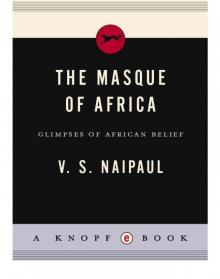 The Masque of Africa: Glimpses of African Belief
The Masque of Africa: Glimpses of African Belief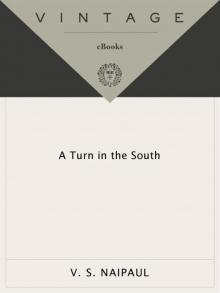 A Turn in the South
A Turn in the South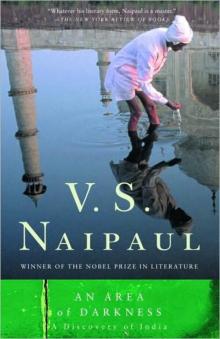 An Area of Darkness
An Area of Darkness Literary Occasions: Essays
Literary Occasions: Essays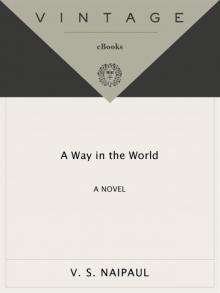 A Way in the World
A Way in the World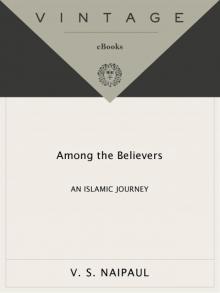 Among the Believers: An Islamic Journey
Among the Believers: An Islamic Journey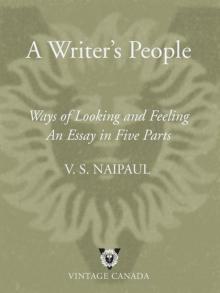 A Writer's People: Ways of Looking and Feeling
A Writer's People: Ways of Looking and Feeling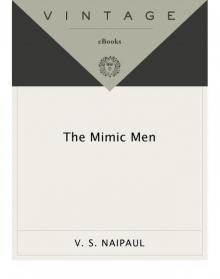 The Mimic Men: A Novel
The Mimic Men: A Novel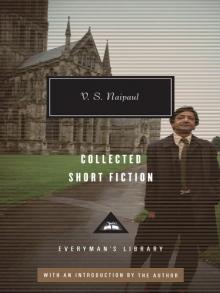 Collected Short Fiction
Collected Short Fiction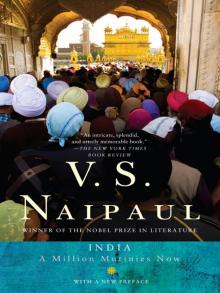 India: A Million Mutinies Now
India: A Million Mutinies Now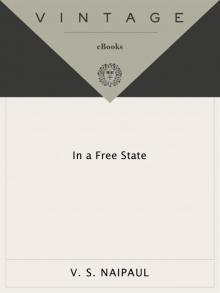 In a Free State
In a Free State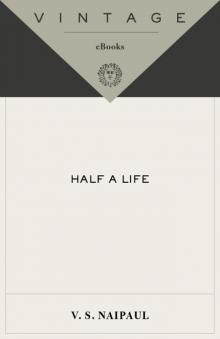 Half a Life
Half a Life Beyond Belief: Islamic Excursions Among the Converted Peoples
Beyond Belief: Islamic Excursions Among the Converted Peoples Guerrillas
Guerrillas A House for Mr. Biswas
A House for Mr. Biswas The Writer and the World: Essays
The Writer and the World: Essays Magic Seeds
Magic Seeds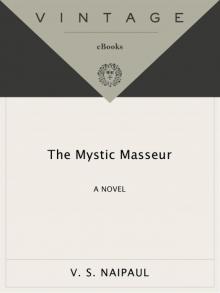 The Mystic Masseur
The Mystic Masseur Miguel Street
Miguel Street The Return of Eva Perón, With the Killings in Trinidad
The Return of Eva Perón, With the Killings in Trinidad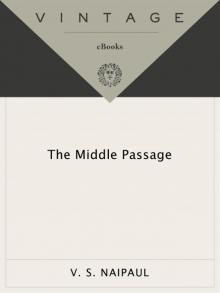 The Middle Passage
The Middle Passage A Bend in the River
A Bend in the River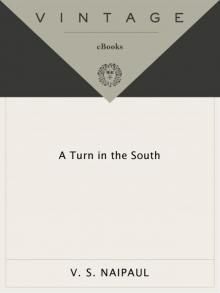 A Turn in the South (Vintage International)
A Turn in the South (Vintage International)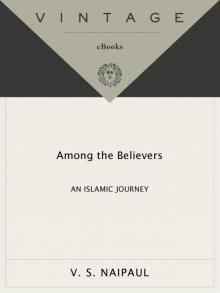 Among the Believers
Among the Believers Literary Occasions
Literary Occasions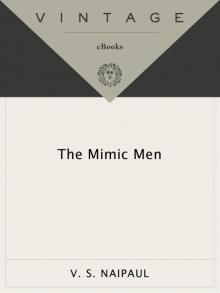 The Mimic Men
The Mimic Men The Writer and the World
The Writer and the World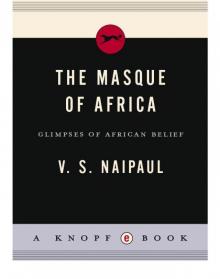 The Masque of Africa
The Masque of Africa